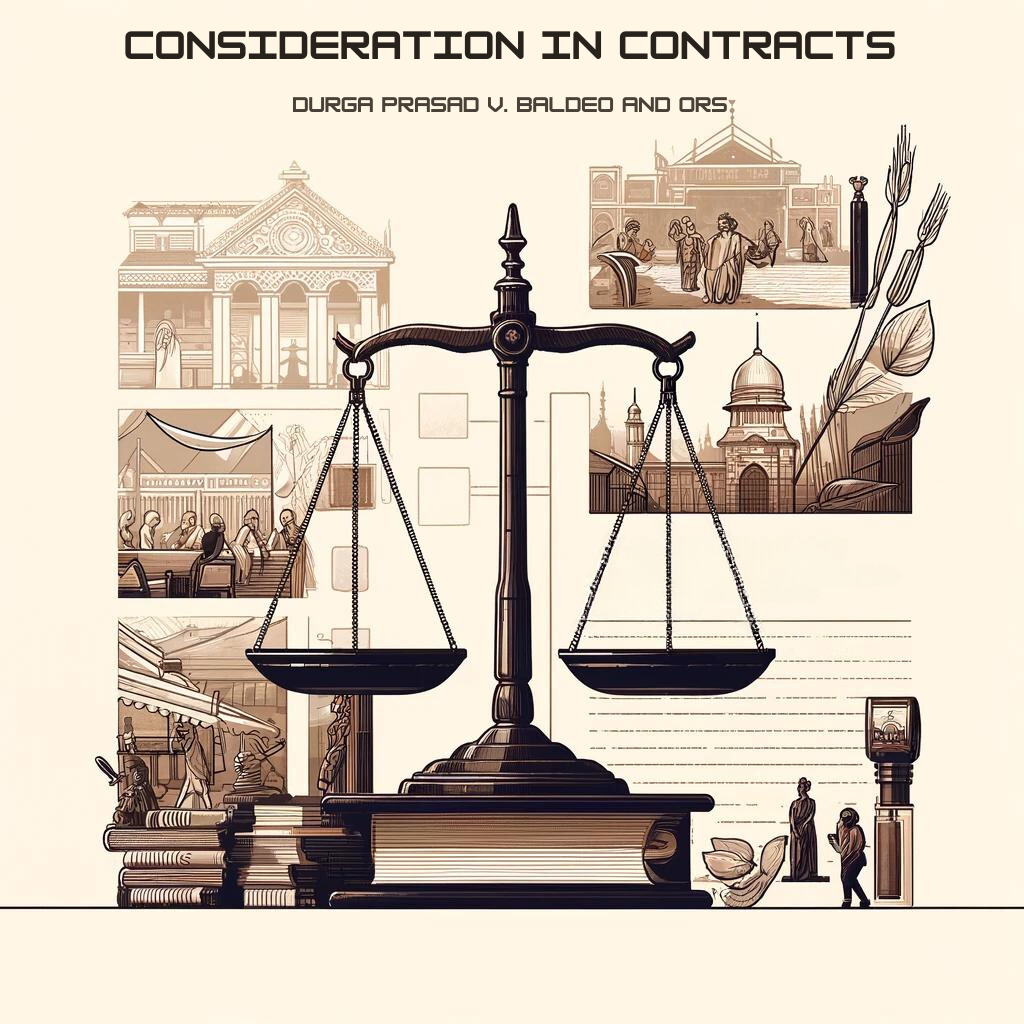This editorial delves into the intricate aspects of consideration in contracts under Section 2(d) of the Indian Contract Act, 1872 (ICA), illustrated through the Durga Prasad case of 1877. A fascinating legal dispute emerges from the establishment of Hume Ganj, a market in Etawah, by Durga Prasad at the encouragement of the local collector. Prasad’s efforts in erecting shops and facilitating the market’s growth. It led him to seek remuneration from the shop occupiers, asserting his role as the market’s “Chaudhari.” However, contention arose when he presented the agreement, claiming the occupiers agreed to pay him a portion of their earnings. He was challenged for lack of consideration under Section 25 of the ICA. The legal journey explores the foundational concept of consideration in contract law, which is pivotal for judiciary aspirants to grasp the nuances of agreements and their validity.

Facts
Establishment of Hume Ganj
In 1862, Durga Prasad initiated the establishment of Hume Ganj in Etawah, a grain market, with the encouragement of the Collector. He invested in erecting shops at his own expense, a foundational effort that underscores the genesis of this legal dispute.
Plaintiff’s Claim
Durga Prasad sought compensation from the shop occupiers for his role in establishing the market, asserting his status as the “chaudhari.” Despite initial recognition by district authorities, this claim was later nullified by the Local Government, leading to a complex legal battle.
Agreement and Legal Proceedings
An agreement was proposed by the Municipal Committee to resolve ongoing disputes. It was refused registration, leading to accusations of forgery and subsequent legal proceedings. This saga culminated in a lawsuit filed by Prasad in 1877 to validate the contentious agreement.
Issues Involved
The crux of this legal battle revolves around the validity of an agreement under the scrutiny of the Indian Contract Act of 1872, particularly focusing on the concept of ‘consideration’ as defined in Section 2(d) and its absence as per Section 25. The core question that emerges is whether the efforts and expenses undertaken by the plaintiff in establishing a market. This was driven by the encouragement of a collector and not at the direct behest of the shop occupiers (defendants). It qualifies as a valid consideration for the agreement demanding payment for his services.
This raises the intriguing legal quandary of whether actions are motivated by third-party requests or societal benefits. However, without direct solicitation by the beneficiaries of such actions, they can form the foundation of a contractual obligation. The issue is layered, delving into the interpretation of what legally constitutes consideration and challenging the traditional boundaries of contractual agreements. It beckons a broader understanding of the nuances of contract law. Thus, it is a riveting topic for judiciary aspirants to explore and critically analyze.
Observations
Consideration Requirement
The court meticulously examined the necessity of consideration for a contract’s validity. It delves into the exceptions outlined in Section 25 of the ICA. This analysis is crucial for understanding the legal framework surrounding contracts without explicit consideration.
Characteristics of Consideration
The nature of the consideration, linked to Prasad’s financial and effort-based contributions to establishing Hume Ganj, was scrutinized. The court’s findings on this matter illuminate the complexities of what constitutes valid consideration.
Actions at Promisor’s Desire
A pivotal observation was whether the plaintiff’s actions, deemed necessary for establishing consideration, were performed at the promisor’s desire. This aspect is vital for judicial aspirants to grasp the nuances of what validates consideration under Section 2(d) of the ICA.
Conclusion
The judgment underscores that consideration in contracts, as defined under Section 2(d) of the ICA, must stem from the promisor’s desire. Actions undertaken at another’s behest, such as by the Collector in this scenario, do not constitute valid consideration. The court ruled the agreement void under Section 25 of the ICA. Thus offering a compelling case study on the essence of consideration in contract law.

